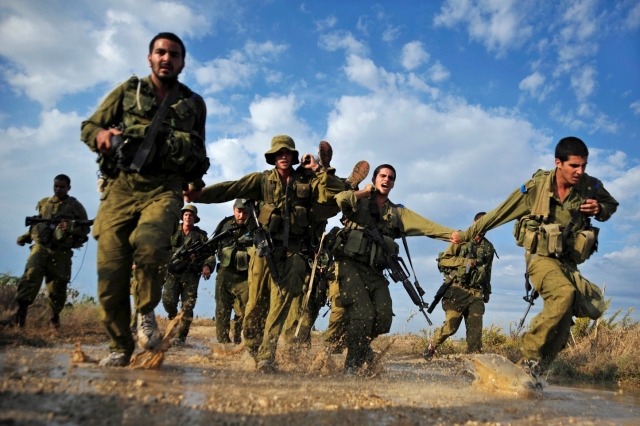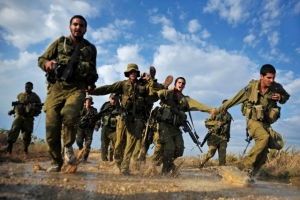The Making of Nations
By Eric Livny
The ISET Economist, a blog about economics in Georgia and the South Caucasus by the International School of Economics at TSU (ISET)
GOING UP … OR DOWN?
I was 13 when my family took the fateful decision to make ‘Aliyah’ to Israel back in 1977. ‘Aliyah’ (the act of going up in Hebrew) is a nice term describing Jewish ‘repatriation’ from the Diaspora (St. Petersburg, in my case) to the Holy Land. Etymologically, ‘Aliya’ originates in the ancient Israelite tradition of annual ‘pilgrimage tours’ to Jerusalem (situated almost 1km above sea level). Yet, there was very little ‘going up’ in the social status of my family during the first five years in Israel.
My parents took more than two years to learn enough Hebrew to be able to land their first jobs. To cut on household expenses, I was sent off to Alonei Itskhak, a Jewish Agency-financed boarding school catering to immigrant kids: recent arrivals from USSR, like myself, and children to barely literate parents who immigrated to Israel from remote rural communities in Morocco, Algeria, Tunis, and other North African nations in 1950s.
Needless to say, the two groups – the ‘Russians’ and ‘Moroccans’ – lived in parallel universes. We attended the same classes but had little else in common. We communicated in different languages, and were different in everything that mattered: from manner of speech and behavior, to hobbies and intellectual interests.
Things changed quite dramatically the following year. I passed entrance exams and was admitted (with a scholarship) to the Hebrew Reali School in Haifa, an elitist private institution that agreed to (very partially) open its doors to outsiders like myself. A more than 2-hour daily commute from Kiriat Ata (a small working class town in Haifa’s vicinity) seemed like a good price to pay for membership in this prestigious club, a hotbed of technological talent, intellectual, military and political leadership.
As the only ‘Russian’ kid in the class, I worked very hard to hide my foreign identity and accent. Thus, I spent hours circling my (very) humble abode in order to practice the difficult Hebrew ‘r’ sound. Very soon I acquired near flawless mastery of the language, but all my efforts to ‘connect’ and become socially accepted fell flat.
Ironically, my classmates and I wore the same uniform consisting of jeans and blue shirts with the school’s motto “Walk Humbly” (Micha, 6:8) sewn to the pocket. Yet, these blue shirts could not conceal the differences in social status between outsiders and those born into upper middle class Israeli families from Haifa’s upscale neighborhoods on Mount Carmel.
By the age of 16, I gave up on desperate attempts to acquire ‘authentic’ Israeli friends and found refuge in the company of other ‘Russians’ closer to my proletarian neighborhood. This could have been the end of my Israeli dream, except that at the age of 18 I was drafted by the Israeli military.
THE GROUND BENEATH MY FEET
The year was 1982. Israel was at war in Lebanon and volunteering to serve in an elite paratrooper unit seemed like the right thing to do. Very soon I found myself in a boot camp with 25 other young guys: Dov Zilber from Moshav Kfar Kish and Ofer Cohen from Naharia; Yair Itzhaki from Kubbutz Kineret and Roni Almagor from Tel Aviv; Amir Halkin from upscale Savion and Pinki Zuaretz from crime-infested Netanya; Arik Libman (myself), son of recent Soviet emigrants, and Omri Sharon, son of the then Minister of Defense and future Prime Minister Ariel Sharon.
|
NATIONAL ARMY, ISRAELI STYLE Military service is a universal duty for Israelis (certainly for the Jews among them). Every young Jewish Israeli man and woman, regardless of their social status, education, or skin color is required to serve in the Israeli Defense Forces (IDF). Moreover, military duty is not only mandated by law but is considered to be a privilege. About a year prior to being drafted, young Israelis start going through a battery of tests designed to examine their psychological fitness, cognitive and physical abilities. The purpose is to optimally match future soldiers and officers (based on their skills and motivation) to military occupations and units. Those selected into occupations that require prior training are assigned to intensive prep courses in programming, technology, languages, etc. Depending on IDF needs, hundreds are allowed to acquire higher education degrees in fields ranging from IT and engineering to medicine and law (yes, the army also employs lawyers!) in order to serve in a professional capacity. |
Once again, I was the only ‘Russian’ in the pack, but this time it seemed to be of little significance. What mattered was your willpower and physical strength; the agility with which you would wake up to substitute for your friend on a night duty or stick your shoulder under a heavy stretcher. It was about who you were yourself and not “what is your father” (a line that stuck with me from A Portrait of the Artist as a Young Man).
This was the moment when I finally started feeling a proud Israeli citizen.
GEORGIA’S NATION BUILDING PROJECT CELEBRATING 130 YEARS
Most Georgians are acutely aware of the fact their country is home to many ethnic and religious minorities – Armenians and Azerbaijanis, Ossetians and Yazidis, Jews and Greek. Yet, few would doubt that despite being divided and ruled by dominant regional powers for much of its history, the Georgian nation has been in existence since times immemorial.
The truth is that, just like all modern nations of our time, the Georgian nation is very a recent creation. Until well into the 19th century, Kartvelian tribes were just that: tribes. Of course, they spoke closely related dialects and had a common religion, but one would have a hard time discerning anything like a common national sentiment. And, indeed, how could there be any unifying sentiment in a territory divided by impassable mountain ranges and artificial borders imposed by rival empires and competing feudal rulers.
Georgia’s revival as a nation started with the country’s political unification under the Russian rule in early 19th century. However, it was not until 1860s and 70s, when influenced by other national movements on the fringes of the Russian empire and elsewhere in Europe, Georgian intellectuals were able to take the country’s nation-building project to the next level. Two notable milestones in this process were the publication, in 1876, of Mother Language (დედა ენა) by Iakob Gogebashvili, and the establishment, three year later, of the Society for the Spreading of Literacy among Georgians. Led by Ilya Chavchavadze, Iakob Gogebashvili and other literati, this charity supported the teaching of the Kartuli vernacular in newly founded schools across the entire country, seeking to establish it as a common national language for all Georgians. Kartuli books, newspapers and magazines published by Chavchavadze et al were just another means of achieving the same goal.
Celebrating its 130th anniversary in 2016, Georgia’s nation-building project is not much younger than most national movements in Europe. However, having achieved independence only in 1991, Georgia is still a very young nation, lacking in maturity and confidence of its older siblings. As we wrote on these pages, to date, Georgians tend to cluster in family groups and clans, and many of the country’s challenges – in business, politics and government – stem from people’s limited ability to let go of these primitive parochial bonds.
Sadly, instead of breaking existing divides, Georgia’s education system and institutions, such as the military, are major detractors from the country’s nation-building project. Instead of facilitating social mobility, Georgia’s public schools are sustaining and deepening existing social and cultural gaps (see “Like Teacher Like Son” on the ISET Economist Blog). Instead of helping heal wounds in Georgia’s social fabric, the Georgian law on military duty and military service effectively divides the nation into haves and have nots. As a result, Georgia ‘national’ army is but an army of illiterate peasants, poorly motivated and unfit for the security challenges of the 21st century.
* * *
The good news is that backwardness comes with an important advantage: ability to learn from the mistakes and successes of others. Israel may face its own share of challenges, but if there is one thing Georgia could learn from Israel it is how to use the military as the ultimate nation-building device.












